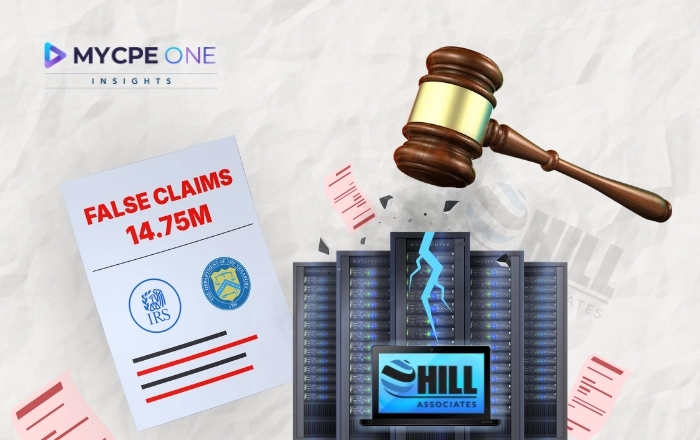


Join 250,000+
professionals today
Add Insights to your inbox - get the latest
professional news for free.

Join our 250K+ subscribers
Join our 250K+ subscribers
Subscribe16 JUL 2025 / BUSINESS

Maryland-based IT firm, Hill Associates, has faced allegations of government contract fraud that led to a $14.75 million settlement under the False Claims Act. Accusations included staffing unqualified IT personnel, billing for unapproved cybersecurity services, not applying required discount rates, and including unauthorized charges in invoices. This incidence highlights increasing pressure for accountability and potential implications for other firms dealing with federal public contracts.
What happens when a trusted IT vendor starts playing outside the lines? If you think government contract fraud is rare or invisible, think again. From a Maryland IT firm’s $14.75 million payout to Delta Air Lines shelling out $8.1 million over Payroll Support Program violations, federal enforcers are cracking down across industries. Hill Associates’ downfall isn’t just a story of technical snafus; it’s a full-blown case study for financial professionals, procurement officers, and IT consultants navigating the high-stakes world of public contracts. And if you thought government fraud was subtle or rare, this saga is louder than a fire drill at a data center. It’s time to break down exactly how Hill got here and why it matters to every accountant, tax professional, and business.
Let’s rewind to 2018. Hill ASC Inc. (also known as Hill Associates), a Maryland-based IT and cybersecurity firm, secured a lucrative deal under the GSA’s Multiple Award Schedule (MAS). Prominent organizations, including the IRS and the Treasury Department, trust this federal fast lane for purchasing technology and services. By all accounts, Hill looked poised for success. However, by 2025, the headlines had flipped the script: $14.75 million to settle allegations under the False Claims Act, with additional payouts possible if revenues spike after the settlement. Turns out, Hill had been billing for:
While Hill Associates hasn’t admitted guilt, the settlement, coordinated across the DOJ, GSA Office of Inspector General (OIG), Treasury OIG, and TIGTA, reflects mounting evidence and pressure for accountability.
“Information technology contractors are expected to charge the government appropriately for their services,” said DOJ Assistant AG Brett Shumate. GSA Deputy IG Robert Erickson doubled down: “Federal agencies should get what they have paid for, nothing less.” And they’re not just talking tough. In 2025 alone, the DOJ recovered over $1.9 billion in fraud settlements across the defense, healthcare, aviation, and technology sectors. This year alone:
No sector is safe when federal funds are at stake. Hill’s penalties didn’t stop at $14.75 million. If their revenue tops $18.8 million between 2026 and 2029, they’ll owe 2.5% of that excess directly to the government. Call it a deferred compliance tax, and a reputational gut punch that could follow Hill for years to come. In a world where trust drives procurement decisions, even the hint of noncompliance can knock you off the shortlist.
This isn’t just about Hill Associates; it’s a loud wake-up call for every firm chasing federal dollars. Here’s what financial and compliance professionals should take to the bank:
Hill’s missteps are familiar territory for anyone juggling scope creep, staffing shortages, or client pressure. However, when the client is the U.S. government, “good enough” won’t suffice.
Where Hill dropped the ball:
Bottom line: the GSA MAS contract isn’t just paperwork; it’s a live blueprint for delivery, pricing, and ethics. Stray from it, and you’re asking for trouble.
In a year where everyone’s chasing AI, cybersecurity, and digital transformation deals, the Hill Associates case reminds us: compliance isn’t a footnote; it’s the front page. Whether you’re an accountant, CIO, procurement officer, or contract analyst, this is the moment to ask: Are we audit-proof? In the high-stakes world of federal contracting, stepping up your plan means more than just winning bids; it means avoiding court. Join 250,000+ pros who read MYCPE Insights for sharp, compliance-ready stories. Subscribe now and stay one step ahead.
Until next time…
Don’t forget to share this story on LinkedIn, X and Facebook
📢MYCPE ONE Insights has a newsletter on LinkedIn as well! If you want the sharpest analysis of all accounting and finance news without the jargon, Insights is the place to be! Click Here to Join
Digital Marketing Services for CPA & Accounting Firms - Starting $399/month.
Struggling to attract new clients? MYCPE ONE’s Digital Marketing Services help accounting firms stand out, generate leads, and grow revenue effortlessly.
With expertise in SEO, paid ads, social media, and targeted PPC, MYCPE ONE maximizes your marketing efforts to deliver high ROI and broader industry reach.
Invest in digital marketing for your firm today—see the difference with MYCPE ONE!
Stand out. Generate leads. Grow revenue.